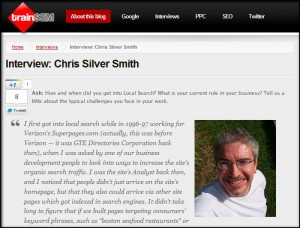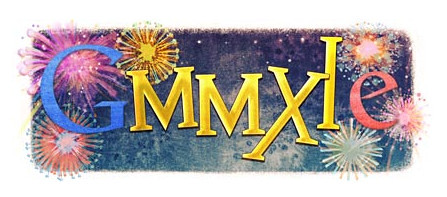 I was interviewed over at Train SEM by the esteemed Ash Nallawalla, arguably the top local SEO and IYP SEO expert of the Asia-Pacific region.
I was interviewed over at Train SEM by the esteemed Ash Nallawalla, arguably the top local SEO and IYP SEO expert of the Asia-Pacific region.
Read it at Train SEM: Interview:
Chris Silver Smith.
 I was interviewed over at Train SEM by the esteemed Ash Nallawalla, arguably the top local SEO and IYP SEO expert of the Asia-Pacific region.
I was interviewed over at Train SEM by the esteemed Ash Nallawalla, arguably the top local SEO and IYP SEO expert of the Asia-Pacific region.
Read it at Train SEM: Interview:
Chris Silver Smith.
Along with many others, I’ve been following the “Local Paid Inclusion” kerfuffle involving Bruce Clay with some interest, and I’ve finally decided to post this comment about the story. Disclosure: I’m on the current Board of Advisors for a company that’s been frequently mentioned along with the story — Universal Business Listing (a.k.a. “UBL”), so I do have a direct interest in these events. While I obviously wouldn’t speak out about UBL without the company’s permission, the thoughts in this blog post are my own opinions and conclusions about the matter, based on my knowledge about the company and people involved. So, read on: (more…)
The Atlantic Wire reported that Occupy Oakland protesters managed to get the name of Frank H. Ogawa Plaza to be changed in Google Maps to “Oscar Grant Plaza” — the name they dubbed it in remembrance of a man killed by BART police on New Years in 2009.
After media began noticing the unofficial name appearing in Google Maps, Google apparently corrected the error. I just did the search, and the plaza is showing the official name within the map, although you can see from the tooltip that some user had been encouraging people to post ratings under the protesters’ nickname for the place:
A Google spokesperson admitted that the name came from user-submitted edits, and that it shouldn’t have been approved, but should have been allowed as a “search reference”. I’ll translate: Google should not have pasted the name on the map as an official place-name, but should have allowed it to be added to their synonym database so that people searching on the name could easily find the location it refers to. As you can see from my screen-grab, it is now functioning as a search reference.
Concerningly, this incident supports what I have been saying, along with others, that Google Maps is particularly prone to Google-bombing from user-submitted content (“UGC”) edits. As I illustrated recently from Mike Blumenthal’s experiment to flag Google HQ as closed, some types of edits can result in businesses getting their listings defaced with false claims that they’re no longer open, and in even worse cases business Place Pages could get forced to rank for obnoxious terms, and labeled with descriptive terms that sabotage business referrals.
I could argue that it’s actually improper for the plaza to be made to rank for the unofficial name in this place, under the condition of a purposeful Google-bombing exploit. I can also argue that it’s useful and helpful for users to be able to search for places under their common nicknames and alternative spellings. But, I bend more towards this being an inappropriate association in this case. The edits were a type of vandalism intended to hijack place-names in maps in order to convey a political message represented by what was probably a relative minority (assuming the Occupy Oakland protest was a part of the nationwide protest movements sparked by Occupy Wall Street, it’s hard to fathom what a police killing in 2009 has to do with the outrage against corporate corruption and economic problems, other than perhaps some desire to kick up the drama a notch or to appeal to a subset of protesters who desire to associate themselves with a sort of iconic martyrdom).
Considering how there are relatively few checks and balances in place, it’s really not surprising that a mob of people can hijack a place name in Google Maps and change it to communicate their political message. This sort of thing is happening on a much smaller scale to hundreds and thousands of businesses which are unfairly harmed by similarly applied user edits.
While it’s great that consumers have a greater voice in this Business 2.0 age, I think some more balance needs to be brought back to “The Force” by way of limiting the easy manipulation of Google Places and it’s vulnerability to such exploits.
I recently wrote a piece about how to bite back at local scam businesses over at Natural Search Blog, but one of the more difficult variety of scams are the faux local business listings that Google Places fights. And, ever since people first began scamming listing rankings in print yellow pages, the worst sector affected is that of Locksmiths.
Quite a number of locksmith listings are for business locations which do not exist or do not have locksmiths’ offices there. Some listings are blatent — they are locations where there are no businesses at all — while others are more subtle, being shopping centers or office buildings which have no locksmith shops in them.
Why do the scammers do this? Well, they figured out that in order to have placement in local search results, (more…)
In the last week, BoingBoing caught my eye by reporting how University of Arizona researchers have announced a new piece of information discovered about the Voynich Manuscript. For those who don’t know, the Voynich Manuscript is one of the world’s biggest mysteries and most-interesting books of all time. Trick is, no one can read it.
The book was discovered in modern times (1912) by a rare books dealier, Wilfrid Voynich, and later after his death it was donated to Yale University (1969).
The book consists of a number of pages with writing and some illustrations divided into sections covering subjects which appear to include Astrology, Herbology, Pharmaceutical, Cosmology, and Medicine. The writing resembles Latinate scripts at first glance, but one quickly realizes that the letters don’t conform to known languages, and even the sequences of words formed by the letters are very odd and do not seem to conform to familiar language patterns. The weird illustrations, with sort of psychedelic combinations of people, plants and tubes, tubs and pipes are puzzling. Are they illustrating biological processes of movements of biles and humors? Are they explaining some weird machinery or alchemical process? The other diagrams of stars and cosmologies in combination make it even stranger:
Over the course of years, the manuscript has been analyzed by many linguists, cryptographers, experts and other hobbyists with no one satisfactorily breaking the code or language that may be involved.
I’ve written before about the Voynich Manuscript, and it continues (more…)
 Okay, I really want one of these — it’s a 17 x 17 x 17 Rubic’s Cube style puzzle:
Okay, I really want one of these — it’s a 17 x 17 x 17 Rubic’s Cube style puzzle:
The puzzle is by Oskar van Deventer, and it can be found here.
I’ll risk exposing how geeky I am by explaining that the original Rubic’s Cube became a super-popular pop culture icon back when I was in middle school and high school. And, in high school, a small handful of us used to compete to see who was the fastest at solving messed-up Rubik’s Cubes. I think I came in (more…)
I continue to hear rumors and rumblings of big changes in the yellow pages industry, and it seems like almost anything could happen in terms of restructuring, mergers and acquisitions. I just learned of a layoff at Yellowbook over the weekend — according to the news report they are saying they’ll cut 70 jobs, nationwide.
There were very recent rumors that Yellowbook might be sold by Yell company, and that it could be an acquisition target for some other major companies. The layoffs are further underscoring unrest and change at the company, so there could be something to the M&A rumors. Some possible buyers have been theorized, including Google and Yellow Pages Group.
I’ve also heard AT&T’s name floated about as potentially interested in Yellowbook — they keep getting whispered about as a possible suitor for buying some of the big YPs. As I reported earlier, AT&T might acquire Dex One and/or SuperMedia.
My theorizing of a “trifecta merger” for AT&T/Dex/Superpages smacks more than a bit of pie-in-the-sky wishful thinking for faltering yellow pages companies, but could we go even farther out there and ask if AT&T might be doing a giant roll-up strategy that brings Yellowbook into the mix as well? (more…)
Google’s “doodle” logo for New Year’s Day today has the “OOGL” of the logo replaced with Roman numerals for two-thousand-and-eleven, and the background of it is full of fireworks going off:

Though not as well known, the letter “G” was also used as a shorthand Roman numeral in the Middle Ages to represent four-hundred, and the uppercase “E” was used to denote two-hundred-fifty. If we included these two numbers, the sequence might be read as 2011 – 400 + 250 = 1861. (more…)
Argent Media
Tuesday, February 14th, 2012I have just launched my own agency, Argent Media, a search marketing firm focused on SEO, Local SEO, Online Reputation Management, and Social Media.
It’s just me for now, although I have friends and contractors I’ve partnered with to collaborate on some projects.
Read the formal press release announcement at: Local SEO Industry Expert Founds Argent Media Search Marketing Agency in Dallas.
Tags: announcements, Argent Media, chris silver smith, SEO agency
Posted in General Commentary, Search Engine Optimization (SEO), Startups | 1 Comment »